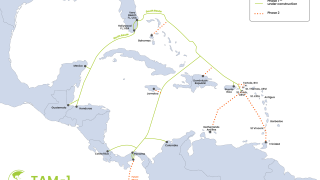|
|
As Europe’s largest economy and second most populous, it is no surprise that the fixed-line segment in Germany is relatively mature, that penetration rates are above the world average and that it has an incumbent which has positioned itself as a market leader in both fixed and wholesale.
Over-the-top services and the vertical sector, particularly financial trading, is now proving increasingly important in Germany, and with many PoPs now being established in the city of Frankfurt as a hubbing point, market watchers are seeing Germany’s central location in Europe proving important in the wider landscape.
In addition to the fact that China and India are also becoming important trading nations, telecoms in Germany has found a new focus as more capacity comes into southern Europe, leading to more operators, specifically in Europe, focussing on a Europe centric routing, rather than a transatlantic one. Essentially, Germany is now becoming a key market to interconnect and distribute wholesale traffic.
One company notably aware of this is Interoute. In February this year, the company acquired KPN’s fibre network in Germany spanning 3,600km, to add to its network already established in Germany, spanning 4000km. By serving such a vast network, Interoute provides a range of services in both data and voice, in addition to providing a low latency route for financial institutions in a country that is at heart of the e-finance service sector.
“Investment in Germany is different because it is a distribution of major cities that you do not get in other geographies,” said Jonathan Wright, commercial director at Interoute. “It does not have one major city as a hub, but a range of industrial cities that is part due to the east and west split. Hamburg is a hub for media, Munich for manufacturing, Frankfurt for finance and in the past 10 years Berlin for politics. Germany’s almost nationwide distribution of where you need to be in order to tap into various industries has driven vast investment in its telecoms market.”
European-based telcos, most notably France Telecom and Telefónica, have recently announced realignments of their businesses in order to keep up with a growing focus in the demand for both wireless and LTE. Along with the Digital Agenda’s plans to ensure that all European citizens should have access to broadband internet speeds of over 30Mbps by 2020, there is an increasing pressure on the European telecoms markets and its telcos to keep to such targets.
On the face of it, Deutsche Telekom made the commitment to invest in this space significantly faster than its rival European super telcos. In March 2010, Deutsche Telekom announced plans to invest over €10 billion in fibre infrastructure between 2010 and 2012 in the region in a bid to secure an increase in mobile data traffic revenue by €6 billion up to 2015, and increase revenues on ‘intelligent networks’ services to €1 billion in the same period; overall, double revenues from five growth areas to reach €30 billion by 2015.
“The industry is changing and we are transforming,” said René Obermann, CEO at Deutsche Telekom, of the investment, in a presentation last year, while Lothar Schröder, supervisory board deputy chairman at the company, commented that fibre optics “paves the way towards a new gigabit society in Germany”.
“Deutsche Telekom has essentially secured a dominant position in the German market because of much weaker fixed-line competition,” said Charlie Davies, analyst at Ovum. “Its main competitors have essentially focussed on the mobile market and this trend has strengthened with the advent of LTE.”
While Deutsche Telekom dominates the fixed-line sector, it is Vodafone Germany that is leading the way in the mobile market. According to TeleGeography, Vodafone Germany has a 32.8% share of the subscriber market from figures reported for the end of June 2011, ahead of Telekom Deutschland, DT’s mobile arm which had a subscriber rate of 31.4%. Telefónica’s German arm was in fourth place behind KPN-owned E-Plus Mobilfunk, with a 16.2% share. Like with most markets, LTE is driving operators to invest in Germany and it is largely assumed by market watchers that Vodafone Germany is leading the way in its deployment.
In July 2011, the company signed an agreement with bandwidth infrastructure provider euNetworks for it to provide the operator with fibre backhaul services across Berlin, Hamburg, Frankfurt and Munich. Uwe Nicki, chief marketing officer at euNetworks, believes such investment in LTE and fibre is essential for a region the size of Germany. “Germany is the largest market in the EU and with internet trends and within the data intensive world we live in, it is natural to assume that investment in telecoms would be large in this key market.” BuddeComm consultancy predicts Vodafone Germany alone will deploy LTE in over 1,500 locations in Germany by the end of year.




